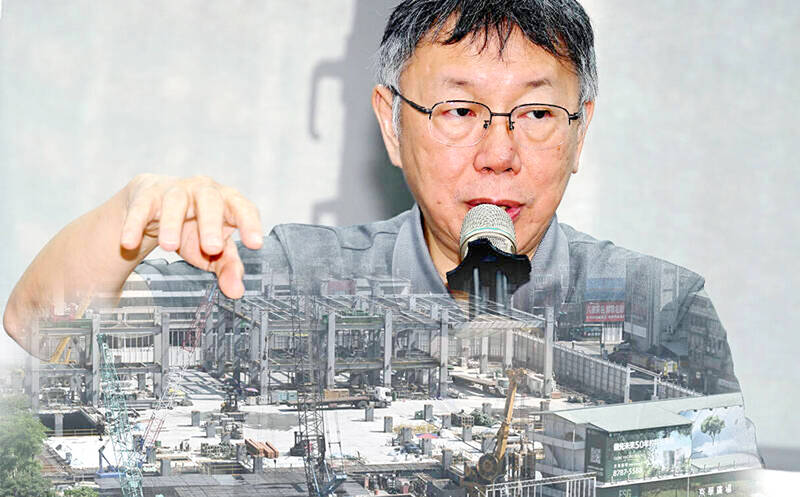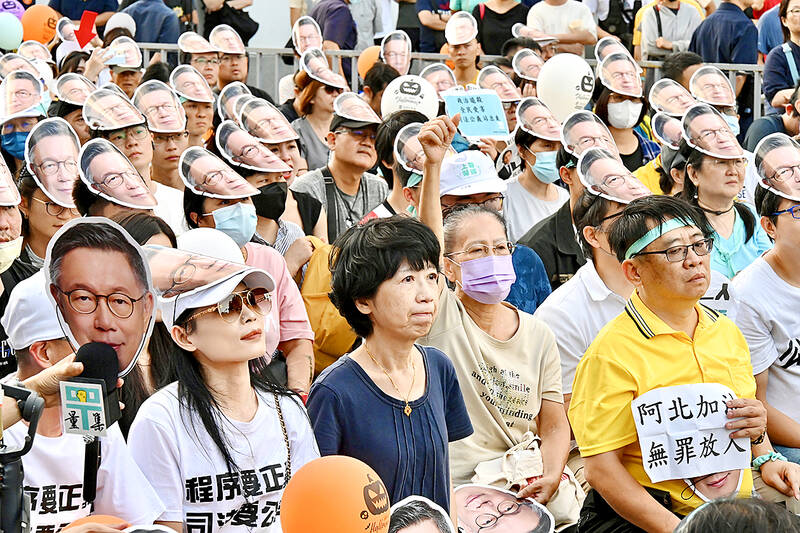Since their leader Ko Wen-je (柯文哲) and others were jailed as part of several ongoing bribery investigations, the Taiwan People’s Party (TPP) has risen in the polls. Additionally, despite all the many and varied allegations against Ko and most of the top people in the party, it has held together with only a tiny number of minor figures exiting.
The TPP has taken some damage, but vastly less than the New Power Party (NPP) did after it was caught up in a bribery scandal in 2020. The TPP has for years registered favorability in the thirties, and a Formosa poll in July showed it was at 31.6 percent. An August poll, taken after the allegations blew up, showed that the party’s favorability plunged to 21.9 percent and their unfavorability spiked from 49.6 percent to 65.3 percent.
However, an Oct. 28 poll released by Formosa, favorability had recovered to 25.7 percent and unfavorability had come down to 57.5 percent.

Photo: Liu Wan-lin, Taipei Times
This means for now they retain their status as the third party. They trail the Democratic Progressive Party’s (DPP) favorability at 46.7 percent and the Chinese Nationalist Party’s (KMT) 39.5 percent, but the support of a quarter of the electorate is still significant.
As a side note, Formosa no longer owns the domain name my-formosa.com, but the polls are still up at my-formosa.com.tw.
AGGRESSIVELY FRUMPY

Photo: George Tsorng, Taipei Times
Though jailed and held incommunicado, Ko has so far not been convicted of any crime. However, there are reportedly some confessions from some of the other suspects, and if even a fraction of the leaks to the press about the evidence the prosecutors have is true, then it does not look good for Ko.
Ko has admitted to engaging in behaviors that are widely frowned upon and illegal, if not rising to the level of criminal. Examples include using campaign subsidies to buy expensive office space for himself, which is not illegal but frowned upon, and the party filing false campaign finances.
There are some patterns and trends that might explain why support for the TPP has not collapsed. In a nutshell, it appears that for TPP supporters, they have made the party and Ko part of their personal identity and it is increasingly resembling a cult in some respects.
From the get-go he appealed to two distinct groups. He’s popular with younger voters, with just shy of 40 percent favorability with the 20-29 demographic, but declining in every age group as they get older, bottoming out at 9.4 percent favorability among those over 70.
The other group is what I called “pox on both of your houses” voters in 2018, and I predicted at the time Ko would win re-election. He did, but only barely.
These are voters that actively dislike both the DPP and KMT and politics-as-usual, and are looking for alternatives. Though there is considerable overlap, this active dislike and desire for alternatives differentiates them from independents, who may or may not share those dislikes and desires and may just be apathetic.
In 2019, the TPP was founded, and the party grew to attract and cultivate some star politicians, with Tsai Pi-ru (蔡壁如), Vivian Huang (黃珊珊), Ann Kao (高虹安) and Huang Kuo-chang (黃國昌) all household names. The party won five legislative seats in the 2020 election, rising to eight seats this year.
Two movements appeared during campaigning last year for the January election. The first was a youth movement that skewed heavily towards young men.
On July 16 Huang Kuo-chang, who was still affiliated with — but increasingly distant from — the NPP teamed up with Holger Chen (陳之漢 aka 館長), a heavily tattooed bodybuilder, self-proclaimed former gangster, gym owner and popular Youtube commentator to hold a “Fairness and Justice to Save Taiwan” (公平正義救台灣) rally in Taipei. Reporters who attended said that the crowd was 70 to 80 percent male.
When Ko showed up at the rally he was treated like a rock star. This movement threw its support behind the TPP, especially after Huang Kuo-chang joined the party in November last year. Chen is now a prominent supporter of Ko and the party.
The other was the formation of the “little sprouts” movement of TPP supporters who would sport cute little stylized green sprouts at rallies. This initially did not appear to be particularly male, but today support for the TPP skews towards men.
The gender gap in favorability towards the DPP is 1.2 percent higher among women and 0.9 higher among women for the KMT. Males are 6.7 percent more likely to support the TPP.
Judging by the turnout at recent rallies and events in support of Ko and the TPP, it appears that between two-thirds and three-quarters of the attendees are male, suggesting a higher level of enthusiasm among the men.
These two movements that merged into one now had a core, enthusiastic base of disaffected young people skewing male and a set of symbols to represent them. They now had a sense of belonging and something to identify themselves with.
Michael Turton presciently wrote in “Notes from Central Taiwan: Taiwan’s emerging ‘polycrisis’” (Taipei Times, Aug. 5, page 13) about disaffected young males worldwide increasingly turning towards the darker side of hard right, while young women are moving toward the left. Specifically, he referenced young male TPP supporters, and wrote “all the pieces of the “polycrisis” afflicting Europe exist here in Taiwan in larval form.”
The very next day, on Ko’s birthday, Grace Woo (吳靜怡) exacted her revenge for being kicked out of the party by dropping the bombshell that many of the entries in the TPP’s financial filings were untrue and there were some questionable transactions worth NT$9.16 million involving the party and three closely linked companies. A month later Ko was in jail.
EIGHT DAYS IN SEPTEMBER
It was during the first eight days that conspiratorial and cult-like messaging went from the fringes of the party to the mainstream. Kicking it off on Sept. 1, Ko’s sister Ko Mei-lan (柯美蘭) posted on Facebook “democracy is already dead, Ko Wen-je is only the first sacrificial martyr, thereafter there will be untold numbers of Ko Wen-jes, for democracy, for fighting corruption they will enter the DPP’s dark prison.”
By the Sept. 8 rally in support of Ko, this sort of talk had taken over the party. Chen described what was happening as “Taiwan’s cultural revolution” and Huang Kuo-chang attacked the president, claiming that his party and the prosecution had merged into one whole and called for war against the “green terror,” borrowing this term from the KMT.
Ko, in a video prepared before the event, said the judicial system and media had become political tools of the DPP. Rally goers carried signs reading things like “oppose dictatorship” and “political persecution,” while TPP lawmaker Wu Chun-cheng (吳春城) called Ko “Taiwan’s (Nelson) Mandela.”
Another TPP legislator, Janice Chen (陳昭姿), said Ko was the manifestation of the Bodhisattva and that he was using the torments his body was subjected to (presumably in jail) to show everyone clearly the political manipulation of the judiciary.
It was at this point that the party was transformed from a party dedicated to scientific methods and pragmatism into something resembling a cult. The pieces were all in place, disaffected youth and especially young men, little sprout iconography, a sense of grievance, conspiracies of oppression and now a martyr.
Donovan’s Deep Dives is a regular column by Courtney Donovan Smith (石東文) who writes in-depth analysis on everything about Taiwan’s political scene and geopolitics. Donovan is also the central Taiwan correspondent at ICRT FM100 Radio News, co-publisher of Compass Magazine, co-founder Taiwan Report (report.tw) and former chair of the Taichung American Chamber of Commerce. Follow him on X: @donovan_smith.

We lay transfixed under our blankets as the silhouettes of manta rays temporarily eclipsed the moon above us, and flickers of shadow at our feet revealed smaller fish darting in and out of the shelter of the sunken ship. Unwilling to close our eyes against this magnificent spectacle, we continued to watch, oohing and aahing, until the darkness and the exhaustion of the day’s events finally caught up with us and we fell into a deep slumber. Falling asleep under 1.5 million gallons of seawater in relative comfort was undoubtedly the highlight of the weekend, but the rest of the tour

Youngdoung Tenzin is living history of modern Tibet. The Chinese government on Dec. 22 last year sanctioned him along with 19 other Canadians who were associated with the Canada Tibet Committee and the Uighur Rights Advocacy Project. A former political chair of the Canadian Tibetan Association of Ontario and community outreach manager for the Canada Tibet Committee, he is now a lecturer and researcher in Environmental Chemistry at the University of Toronto. “I was born into a nomadic Tibetan family in Tibet,” he says. “I came to India in 1999, when I was 11. I even met [His Holiness] the 14th the Dalai

Following the rollercoaster ride of 2025, next year is already shaping up to be dramatic. The ongoing constitutional crises and the nine-in-one local elections are already dominating the landscape. The constitutional crises are the ones to lose sleep over. Though much business is still being conducted, crucial items such as next year’s budget, civil servant pensions and the proposed eight-year NT$1.25 trillion (approx US$40 billion) special defense budget are still being contested. There are, however, two glimmers of hope. One is that the legally contested move by five of the eight grand justices on the Constitutional Court’s ad hoc move

Stepping off the busy through-road at Yongan Market Station, lights flashing, horns honking, I turn down a small side street and into the warm embrace of my favorite hole-in-the-wall gem, the Hoi An Banh Mi shop (越南會安麵包), red flags and yellow lanterns waving outside. “Little sister, we were wondering where you’ve been, we haven’t seen you in ages!” the owners call out with a smile. It’s been seven days. The restaurant is run by Huang Jin-chuan (黃錦泉), who is married to a local, and her little sister Eva, who helps out on weekends, having also moved to New Taipei